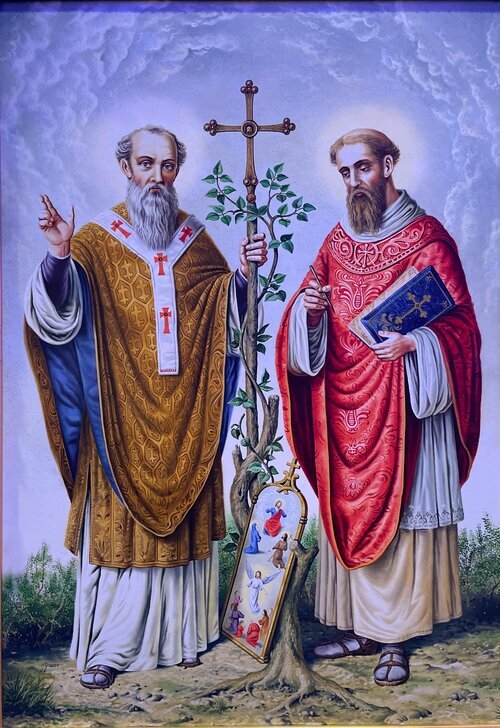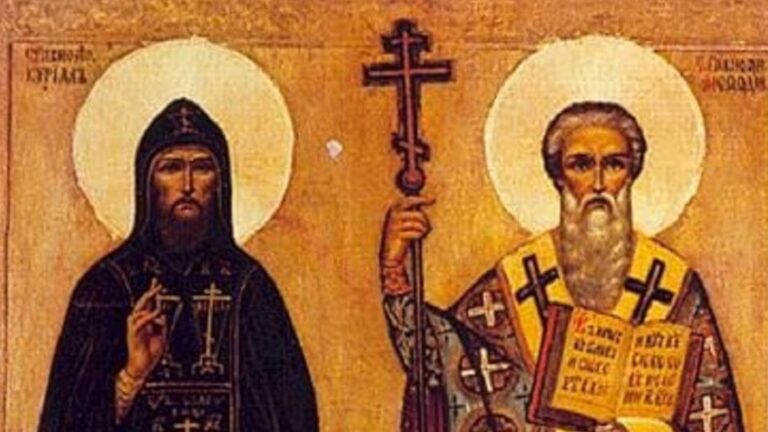On February 14th, the day of two saints who were brothers and born in the 9th century is celebrated. As a result of their work, Saint Cyril and Saint Methodius are venerated for their educational and cultural mission among the Slavic people.
In the name of the Father, and of the Son, and of the Holy Spirit. Amen
Our help is in the name of the Lord,
who made heaven and earth.
O Lord hear my prayers,
and let my cry come unto you
Examination of conscience…
Lord have mercy…
Christ have mercy…
Lord have mercy…
 OPENING PRAYER
OPENING PRAYERGod the Father of kindness, enlightened by the missionary ideal of Saint Cyril and Methodius, may we too be clothed with the grace to bring the message of love that flows from the gospel to the most abandoned men and women of our time, bearing witnesses to the life of the gospel in the imitation of saint Cyril and Methodius. through their humble prayers, may we come to enjoy the graces of (name your intentions). Through our Lord Jesus Christ your Son, who lives and reigns with you and the Holy Spirit, God forever and ever. Amen.
Saint Cyril and Saint Methodius, pray for us.
MEDITATION: THE STORY OF THE TWO BROTHERS – CYRIL AND METHODIUS
(Part 2 – BRIEF BIOGRAPHY & THEIR CONTRIBUTION TO MISSION AND THE LIFE OF THE CHURCH)

From the time they were boys in Thessalonica, the brothers could speak Slavic. When the Moravian king Ratislav, unhappy with the Latin Christianity preached in his Slavic country by Charlemagne’s German missionaries, turned to Constantinople for help, Constantine and Methodius were again summoned from their monastery and sent by Emperor Michael II to Moravia. This mission was to be their lifetime concern. In 863 the brothers reached the country (today the Czech Republic) and immediately began teaching and preaching in the Slavic language of the people. They started a school to train young men for the priesthood. They conducted the liturgical services in Slavic and eventually developed a special Slavic alphabet in order to put the Bible and the liturgy in writing.
For 5 years Constantine and Methodius worked steadily to establish Christian worship according to the forms and language of the Moravian people. They inevitably clashed with the German missionaries, who were committed to the Latin form of Christianity. The two brothers were invited to Rome in 868 by Pope Nicholas I to explain their work. The Pope was so impressed by their success that he made them both bishops and, contrary to expectation, authorized them to carry on their ministry in Slavic. Constantine, however, had no further desire for the active missionary life. He entered a monastery in Rome in 869 and took a new name, Cyril, as a sign of his new life. Fifty days later he died.
Methodius returned to Moravia and continued his efforts for 16 years more. An incident in 871 extended his influence still further. The visiting king of Bohemia was invited to dine with the Moravian king. The guest found that he and his entourage were considered heathens and were expected to sit on the floor, while the host and Bishop Methodius, as Christians, were being served at a raised table. He asked what he could expect to gain by becoming a Christian. Bishop Methodius said, “A place higher than all kings and princes.” That was enough. The king asked to be baptized, along with his wife and entire retinue and returned to Bohemia to encourage many of his people to accept the Christian faith.
Methodius’s difficulties with the Latin clergy continued to plague his later years. He was summoned to Rome again in 878 by Pope John VIII. This time the influence of the Latinists was stronger. The Pope decreed that Methodius must first read the Mass in Latin, then translate it into Slavic. The bishop returned, subdued. He died in 885. Cyril and Methodius were considered heroes by the people and were formally recognized as saints of the Roman Catholic Church in 1881.
- (Culled from the Catholic online Encyclopedia)
TO BE CONTINUED…
 CONCLUDING PRAYER
CONCLUDING PRAYER
Through the intercession of saints Cyril and Methodius, may the Lord bless + us, protect us from all evil and bring us to everlasting life. Amen.
Shalom!
Compiled by Fr. Chinaka Justin Mbaeri, OSJ
Paroquia Nossa Senhora da Immaculada Conceição, Paulo Ramos, Maranhão, Brazil
nozickcjoe@gmail.com / fadacjay@gmail.com
___________________________________
PS: Have you prayed your Rosary today?



Thank you Padre for all the good work God is using you to do. May the Lord continue to strengthen you in the Apostolic ministry.
Amen
Saint Cyril and Saint Methodius, pray for us!
Amen
Saint Cyril and Saint Methodius, pray for us!
Sts Methodius and Cyril, pray for your children to vote their conscience
Amen
Sts Cyril and Methodius pray for us
Amen
Saint Cyril and Saint Methodius, pray for us
My saint Cyril and saint methodius intercede for all who don’t have the hope in preaching the gospel of Christ to people around find strength and courage to do so through Christ our Lord Amen.
St Cyril and Methodius please intercede for our country Nigeria at this time of elections so that the right people are put in place.
Amen
Amen
Amen
Amen
Saints Cyril and Methodius pray for us and may God Almighty grant our prayers through your intercession Amen
Amen
Amen
St Cyril and St Methodius, pray for us
Amen
Saint Cyril and Saint Methodius, pray for me and my family Amen
Thank You JESUS……
Saints Cyril and Methodius pray for us. Amen
Amen
Through your intercession may my four months salary be paid and may God bless Frank and Margaret relationship
Amen
St Cyril and St Methodius
Pray for us
Sts Cyril and Methodius, pray for us.
St Cyril & St Methodius Pray for us Amen
Saint Cyril and Saint Methodius, pray for us. Amen.
Saint Cyril and Saint Methodius, pray for me, my husband, and my children. Amen
S S. Cyril and Methodius , Pray for us Amen
Amen
St. Cyril and St. Methodius …….pray for us. AMEN
Amen
StCyril & St. Methodius, pray for us!
Amen
Amen . St. Methodious and St Cyril, pray for us
Amen
Amen.
Amen
Thank you Jesus for all you did, for what you are doing and for what you will still do
SS Cyril and Methodius, pray for us
Great st Cyril Mrthodius pray for my daughter Elizabeth’s safety and health where ever she may be amen
Saint Cyril and Saint Methodius, pray for us! Amen.
Saint Cyril and Saint Methodius, pray for us Amen
May our lives and living of Sts. Cyril and Methodius affect our lives and living.
Thank you Jesus
St. Cyril and St. Methodius, pray for us. Obtain for us the grace of perseverance in the things of God
Saints of God pray for us. Amen
Sts Cyril and Methodius, intercede for us Amen.
Amen